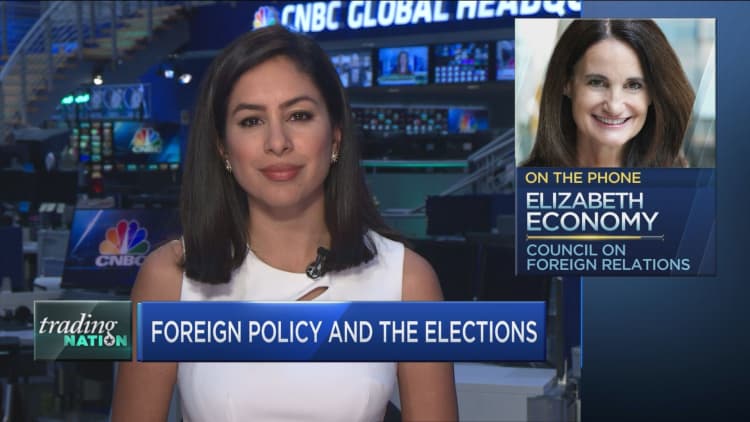
China remains the biggest foreign policy risk facing the U.S., according to Liz Economy, a senior fellow at Stanford University's Hoover Institution and the Council on Foreign Relations.
Both President Donald Trump and former Vice President Joe Biden acknowledge the risk that China poses to the U.S. – from an economic and national security standpoint.
However, the two candidates have competing views on how to confront Beijing.
"I think if Trump earns another four years, he is going to double down on China, and it's going to mean more resources — military, economic and political — dedicated towards pushing back against China at multiple levels. It will be economic, it'll be military, and it'll be political," Economy, author of "The Third Revolution: Xi Jinping and the New Chinese State," said Tuesday on CNBC's "Trading Nation."
As president, Trump has waged a trade war with China, increased scrutiny of Chinese companies doing business in the U.S. and taken aim at firms like TikTok. These actions have contributed to a further decoupling between two biggest economies in the world.
Two-way capital flows between the U.S. and China have dropped to a nine-year low, according to the Rhodium Group.
The number of Chinese IPOs in the U.S. has gradually declined in recent years, from 33 in 2018 to 28 in 2019. So far in 2020, 26 Chinese companies have gone public in the U.S.
Renaissance Capital sees this number declining in the coming year due to stringent accounting requirements.
"At the end of next year, Chinese companies going public here will have to comply with U.S. accounting oversight just as every domestic company has to do. We believe that this will result in fewer Chinese listings," Kathleen Smith, co-founder and principal at Renaissance Capital, said to CNBC over email.
If Biden were to win the White House, the Democratic candidate says he too will be tough on China. What's unclear, according to foreign policy experts, is whether he will remove Trump's nearly $400 billion tariffs on Chinese goods. Biden has called Trump's use of tariffs "self-defeating."
Trade experts also want to know if Biden will bring the Trans-Pacific Partnership trade agreement back which was passed under the Obama Administration but was then rejected by Trump when he became president in 2017.
What is clear is Biden's intention to work with allies to challenge China versus going at it alone.
"I think the most significant China-related policy shifts in a Biden administration may be a renewed commitment to U.S. leadership in addressing global challenges such that China cannot capture and contort the global governance system to suit its narrow interests; greater consultation with our allies and partners to forge a consistent and coherent China strategy; and a recalibration of the U.S.-China relationship that could include reestablishing the bilateral dialogue and exploring areas of common purpose in order to avoid the relationship spiraling into a cold war," said Economy.
A broader China policy may become even more pressing as Beijing sets its eyes on expanding its footprint through its Belt and Road Initiative while also intensifying its presence at the India-China border and in the South China Sea.
"Xi Jinping's ambitions are very clear, you only have to listen to what he says, there are no mysteries here. You know he wants China to be the predominant power in Asia. He wants China to, you know, to get its sovereignty issues settled. That means Taiwan, Hong Kong and the South China Sea. And beyond that, it's going to mean the border disputes with India and Japan and South Korea that are going to be next in line for him. It's the Belt and Road spreading Chinese influence -- political, military, economic -- and it's about, you know, China setting the standards for the 21st century," said Economy.
Despite the geopolitical risks, U.S. companies Caterpillar, Starbucks and General Electric among others referenced the strong growth they are seeing in China on third-quarter earnings calls. Analysts say it remains a key growth market for major multinationals given the choppy recovery in the U.S. and Europe.






